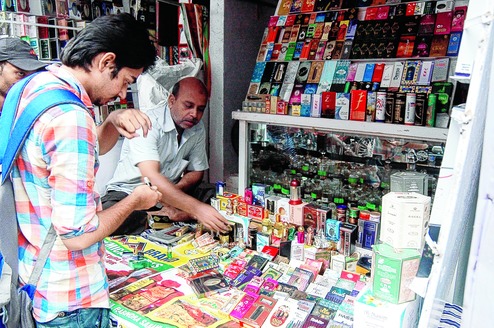
Id fragrance is all around.
As Muslims throng the markets in Patna to prepare for celebrations that come after a month-long fast, ittar (also known as attar) or perfume is a must buy on the Id shopping list.
Ittar bottles manufactured in different states and countries line up the shelves of perfume shops, as people come looking for their favourite fragrances, which they will dab on their new clothes to be worn on Id. Most ittar shops are located in Patna Market, Sabzibagh, New Market, Raja Bazar, and many parts of Patna City.
Jamal Ahmad, who runs a shop, Gazipur Star, at Patna Market, said: "People generally demand light and long-lasting aromas. We try to offer varieties of ittar from natural ones to international brands."
Natural ittar is pure and is extracted from flowers like rose, jasmine, sandalwood and other perfumed plants and herbs through distillation process. "Jannat-ul-Firdaus, Rose, Majmua, White Oudh and Aseel are ittars that are most in demand," he said.
"Educated people prefer natural ittars because alcohol-based deodorants and perfumes should not be used in auspicious occasions. However, they are costly and come in limited quantity. Most of our buyers have switched over to synthetic ittar that we bring from Kanpur, Varanasi, Mumbai, Gujarat, Karnataka and even Saudi Arabia. Blue Lady and Charming Girl are a craze among women this time," said Mohammad Aslam, who has an ittar shop in Phulwarisharif.
Ittars available across Patna range between Rs 50 and Rs 8,000 for small bottles that contain 5ml to 50ml of the liquid. Some of the bottles sport a traditional look to attract buyers.
It is believed that ittar attracts angels and guards against evil spirits. Muslim and Sufi saints would offer it to God and wear it to assist them in their spiritual journey. Devotees offer it on the tombs of saints.
" Ittar was loved by Prophet Mohammad and that is why it has a special place in Islam. I do not consider myself fully dressed until I apply ittar," said Ibrahim Nami, a schoolteacher who resides in Sultanganj of Patna City.
Zafar Siddiqui, 68, however rued that natural perfumes are vanishing from the market after the advent of synthetic aromas. "I wait for Ramazan because I get an opportunity to buy my favourite Hina ittar, as perfume sellers stock their supplies. It is difficult these days to get natural perfumes, as shopkeepers don't keep a huge collection," he said.
The stature of ittar has witnessed a decline over time. A few decades ago, natural ittars were available abundantly in the market, but with globalisation and technological progress they have been replaced by artificial and imported scents because of increasing public demand. The change in customer preference has been marked in the past 15 to 20 years.










